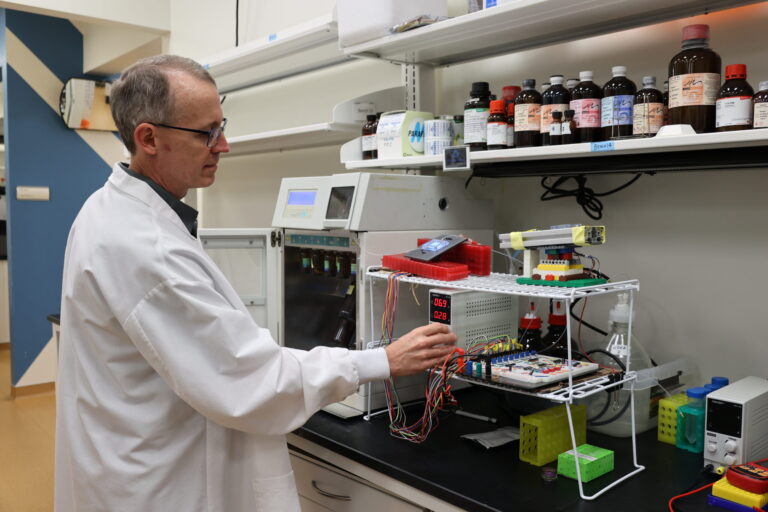The state Budget Committee on Tuesday approved spending $27 million to the Wisconsin Economic Development Corp. to fund grants aimed at creating regional tech hubs and helping communities affected by the University of Wisconsin closure. The committee also approved spending money to the Department of Corrections to cover the costs of youth serving adult sentences.
One of the requests the committee approved Tuesday was for a $7.5 million grant to a Wisconsin biohealth nonprofit, the next step in establishing a regional technology hub in the state.
Wisconsin was designated a regional technology hub by the U.S. Department of Commerce in October 2023 after a consortium of public agencies, private companies and nonprofit organizations applied for federal grant funding. The state is set to receive $49 million in federal funding for technological advances that improve disease diagnosis and treatment, and for its Center for Personalized Medicine, an approach that customizes tests, treatments and therapies to a patient’s unique genetic code, medical records and environment.
Consortium members include WEDC, University of Wisconsin System Administration, University of Wisconsin-Madison, GE Healthcare, Rockwell Automation, Exact Sciences Corporation, Employ Milwaukee, Accuray, Plexus, WRTP Big Step, Milwaukee Area Technical College, Madison Area Technical College, Madison Region Economic Partnership, Milwaukee 7 and BioForward.
In addition to the federal funding, state funding approved by lawmakers on Tuesday will go to BioForward, a trade group for Wisconsin biohealth companies and lead consortium member. The state was required to match the federal grant in order to be designated a regional innovation hub.
Under Bill 96, the funding can be used to establish a workflow and supply chain support center for image-guided therapy and theranostics, build expanded shared labs and lab-related programming, and assist manufacturing and supply chain companies in developing apprenticeship programs and develop programs to provide incentives for employers to hire apprentices.
The funding was allocated by the state Legislature and Gov. Tony Evers under Wisconsin Act 96, which was signed into law in February. The money was only available after the state received federal funding to develop a biohealth technology hub. Announced last week.
“Our state’s designation as a tech hub marks an exciting and pivotal moment for Wisconsin, placing our state at the center of our efforts as we work to build Wisconsin’s economy and workforce ready for the demands of the 21st century,” Evers said in a statement ahead of the JFC meeting. “I look forward to these funds from the JFC being disbursed without delay so we can jumpstart this effort, grow our workforce and economy, and position Wisconsin at the forefront of personalized medicine and biohealth technology in the nation.”
Lawmakers on the committee celebrated the funding approval.
“I want to take a moment to thank President Joe Biden and Vice President Kamala Harris for continuing to make these important investments in Wisconsin,” said Rep. Tip Maguire. The federal grant program Wisconsin participates in was established under the CHIPS and Science Act of 2022.
State Rep. Shannon Zimmerman, R-River Falls, called the tech hub a “great opportunity.”
“I really appreciate everyone who supported this bill, everyone who introduced it. With the national debt approaching $35 trillion, there’s a debate about whether the federal government has the money, but that’s a different story,” Zimmerman said while criticizing the Biden administration. (The federal debt grew under the administrations of both Presidents Donald Trump and Joe Biden.) “During the budget process, we heard a lot about Wisconsin’s identity changing… This is an example of where we can strengthen our new identity in biohealth.”
The committee also Approved the release of $20 million. WEDC’s donations will be used to provide grants to communities affected by the closure of University of Wisconsin branch campuses.
The recent closures of University of Wisconsin branch campuses, including the University of Wisconsin-Platteville-Richland campus, the University of Wisconsin-Milwaukee-Washington County campus, and the University of Wisconsin-Oshkosh-Fond du Lac campus, have left local communities facing a potential economic crisis. Under a law signed by Governor Evers in March, communities are eligible to receive $2 million in grant funding through a program established by WEDC that is intended to cushion some of the impact.
The committee also approved a request from the Department of Corrections to transfer $2.5 million to cover costs for youth serving adult sentences in Lincoln Hills and Copper Lake.
According to the Legislature’s Fiscal Office, the agency had been hit with a budget shortfall due to a higher than expected number of youths serving adult sentences. The state budget included about $18.3 million in contract costs to house youths serving adult sentences in Lincoln Hills and Copper Lake, including an average daily population of 10 youths serving adult sentences in Lincoln Hills. Since that estimate, the population has doubled and remains at a high level, leading the agency to estimate in March that it would cost more than $20 million.
Funds to make up the shortfall would be shifted from DOC’s budget for reimbursing counties for probation, extended supervision and parole holds, as well as the budget for services for DUI offenders.
Get morning headlines delivered to your inbox


